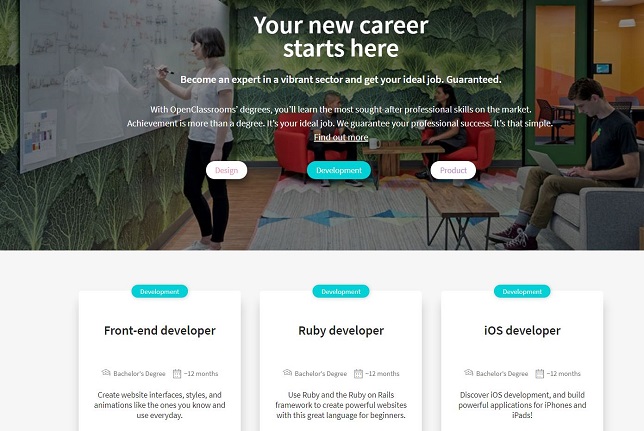New Online Bootcamp Comes to the States; Offers Free Access to 'Dreamers'
- By Dian Schaffhauser
- 10/04/17

OpenClassrooms provides certification tracks in development, product management and more.
A new bootcamp is coming to America, this one by way of France. OpenClassrooms is an online program that offers certification tracks in development, product management and, soon, design. Coursework can be done anywhere if the student has access to the right computing gear and the internet. Graduation comes with a job guarantee: If the learner complies with the rules and doesn't get a job within six months, he or she is eligible for a tuition refund. As part of its entry into the U.S. market, the company is also offering DACA "Dreamers" access to one flavor of its training services.
Right now, the focus for the school is on development training: front end, Ruby, iOS, Android or "full stack." The programs are structured to take 12 months to complete. They all include hands-on projects. As an example of one of the programs, the iOS developer learning path includes 11 projects, which run from an estimated 10 hours to 100 hours each; in total the projects will take about 715 hours of work, according to the company, equivalent to working full-time for 18 weeks.
A "premium plus" edition comes with access to a personal mentor via weekly video chats and an online community of peers. The cost for the "plus" version is $300 per month for as long as the program takes for completion. A $20 per month "solo" program is non-binding and gives access to the courses without the mentoring or job guarantee.
In the plus track, although OpenClassrooms bandies about "bachelor's degree" as an outcome for somebody who completes the program successfully, it's a generous translation of the term. The website refers those interested in learning more to the National Directory of Professional Certifications (RNCP), which issues professional certificates, in this case, specifically for a web developer.
Also, the employment guarantee comes with a few stipulations. To qualify for a refund, the candidate must have applied for at least 10 positions a week anywhere in the country and agree to transfer when an appropriate job is offered. Those activities need to be documented and fed to OpenClassrooms on a regular basis. The student also needs to check in with a mentor monthly during the work hunt.
Currently, the company reported, 100 percent of its graduates are employed globally; all of them obtained their positions within the allotted six months. In Europe, the courses are accessed by 3 million users each month, the company said.
As part of OpenClassrooms' American launch, the company has introduced a "Dream On" initiative for students who are recognized by the Deferred Action for Childhood Arrivals policy (DACA). These "Dreamers," as they're called, will be allowed to pursue "lifelong education" from the company through a premium solo membership.
"Reading, writing and digital skills – such as learning to code – will become the new normal, and, to succeed, students will need to take a three-pronged approach to learning that includes high-quality course content, customized mentoring programs and hands-on learning opportunities," said company co-founder and CEO Pierre Dubuc, in a press release. "OpenClassrooms is the premier platform that provides everyone with the opportunity to gain coveted technical skills that are invaluable in today's job market in a flexible, credible online learning environment – with guaranteed success."
About the Author
Dian Schaffhauser is a former senior contributing editor for 1105 Media's education publications THE Journal, Campus Technology and Spaces4Learning.